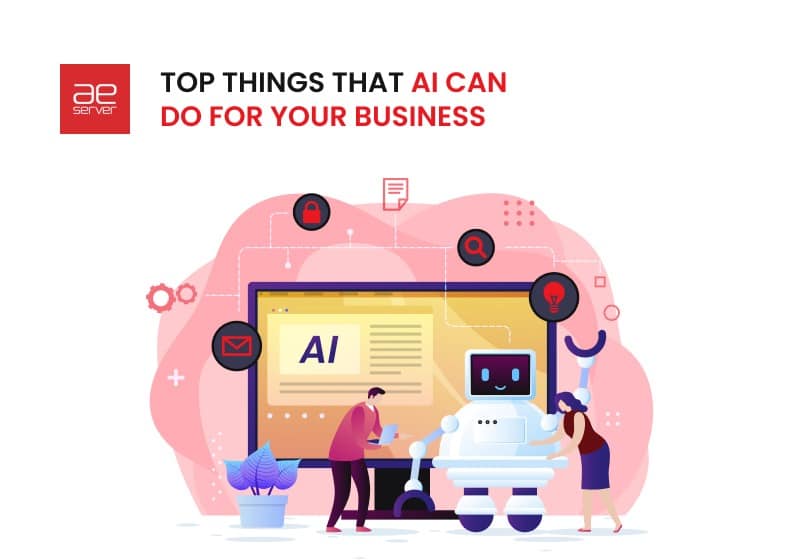
How to Use AI in Mobile App
There is a secret superhero in a world where our cell phones have become like our faithful assistants. It’s Artificial Intelligence, or AI for short. Think of artificial intelligence as a magic wand. And with its help, your mobile applications become smarter, faster, and cooler.
Artificial Intelligence (AI) has emerged as a game-changer in mobile app development. It truly revolutionized the way apps interact with users. Integrating AI in mobile apps has ushered in a new era of possibilities. From constructing highly personalized user experiences to implementing intelligent automation for enhanced efficiency.
The impact of artificial intelligence in apps is profound. It encompasses a wide array of functionalities. Developers can employ AI to create apps that understand user preferences. It provides context-aware recommendations, and even engages in conversations.
To embark on this journey of AI app development, one must follow a systematic approach. This guide will cover AI app development in simple, everyday language. So, grab your mobile device and get ready to unlock the secrets of AI in mobile apps.
Types of AI-powered Features for Mobile Apps
AI mobile app development transforms mobile apps. It makes them more intelligent and user-friendly. Here are some key categories that are taking over the mobile app world:
| Personalization and Recommendation Systems
| Artificial intelligence allows us to analyze user behavior and preferences. The main goal is to provide personalized content and product recommendations. Apps like Netflix and Spotify excel in this domain. They have ensured that users can find content that matches their tastes. |
| Natural Language Processing (NLP)
| NLP enables chatbots, voice assistants, and language translation in mobile apps. Siri and Google Assistant are prime examples. They simplify tasks through voice commands and text input. |
| Image and Video Recognition
| Apps like Instagram and Snapchat employ AI to recognize and filter images and videos. It enhances user-generated content and augmented reality. |
| Predictive Analytics
| Artificial intelligence in apps can predict user behavior. It allows apps to make suggestions in advance. In e-commerce apps, it can recommend products. For example, fitness apps can predict workout results. |
| Virtual Reality (VR) and Augmented Reality (AR)
| AR apps with artificial intelligence, such as Pokémon GO, combine digital elements with the real world. It makes it possible to create immersive games and interactive experiences. |
Steps to Successfully Implement AI in Your Mobile App
Successful implementation of artificial intelligence in a mobile app requires a strategic approach. Therefore, we suggest you learn how to use AI in mobile apps. It will help you to use this modern technology competently and correctly in the future:
- Begin by clearly defining your objectives. Identify specific problems or challenges that AI can address within your mobile app. Determine whether you need features like image recognition. Whether it can be natural language processing or predictive analytics.
- Gather relevant data for AI training. Data quality is paramount to creating accurate AI models. Ensure that your data is clean, well-structured, and suited for machine learning algorithms. You may need to pre-process your data. Choose the appropriate AI frameworks and tools. They should match the requirements of your project. Popular options are TensorFlow and PyTorch. You can also use cloud-based AI services such as AWS, Google Cloud or Azure.
- The development phase involves coding. You need to train the models on the prepared data, and fine-tune them. This way, you can achieve optimal performance. Training AI models you can easily integrate into app development. Ensure they interact effectively with the app’s front and back end.
- Thorough testing. After training, you need to conduct a thorough testing of the AI-enabled mobile app feature. This way, you can identify and eliminate any issues and bugs. Evaluate the accuracy and performance of AI models in real-world scenarios.
- Collect feedback. Once the app is in the hands of users, collect imperative feedback. This way, you can continuously improve and enhance the artificial intelligence features. User input is invaluable for enhancing the overall user experience. Therefore, you can effectively implement AI in your mobile app development. It offers users intelligent and valuable features that cater to their needs and expectations.
In conclusion, the successful implementation of artificial intelligence involves a strategic approach. If you follow these steps, you can harness the power of artificial intelligence. You can improve the user experience and provide features that meet expectations.

Real-world Examples of AI-powered Mobile Apps
Numerous mobile apps have harnessed the transformative power of AI to offer ingenious solutions. It enhances user experiences across various domains. Here, we delve deeper into a selection of artificial intelligence in apps:
- Prisma. Prisma has revolutionized photo editing. It uses AI to transform ordinary photos into captivating artworks. It achieves this by emulating the distinct styles of renowned artists through neural networks. Users can turn their snapshots into stunning masterpieces with a single tap. It makes artistic expression accessible to everyone.
- Duolingo. Duolingo has reshaped language learning through personalized AI-driven experiences. It adapts language lessons based on a user’s proficiency and learning pace. It ensures a tailored and optimized learning journey. This approach has made language learning engaging and effective for millions of users.
- Calm. Calm is a popular meditation and relaxation app. It utilizes AI mobile app development to deliver customized mindfulness experiences. Analyzing user preferences and moods tailors meditation sessions to match individual needs. Calm’s AI-driven approach enhances relaxation, reduces stress, and fosters mental well-being.
- Grammarly. Grammarly’s AI-driven keyboard has become indispensable for users seeking impeccable writing. It offers real-time grammar and spell checks and suggestions to enhance writing quality. This AI-powered assistant seamlessly integrates with various apps and platforms. It ensures clear and error-free communication.
- Waze. Waze has redefined navigation and commuting with its AI app development. The app provides real-time traffic updates, route optimization, and dynamic rerouting. All are based on live data from millions of users. Waze’s AI-driven approach ensures users reach their destinations efficiently. It’s while staying informed about road conditions and hazards.
These examples highlight the huge potential of mobile app development using AI. They demonstrate how AI can enhance creativity, personalize learning, and so on. As artificial intelligence technology advances, we can expect new innovative applications to emerge. It will enrich our experience of using mobile apps in various domains. AI is catalyzing transformational change and bringing practical benefits to users worldwide.
Future Trends of AI in Mobile Apps
The future of artificial intelligence in apps is brimming with promise. It is poised to unleash a wave of innovation that will reshape how we interact with our devices. Several exciting trends are on the horizon:
- AI-Enhanced User Interfaces. AI is set to redefine user interactions by making interfaces more intuitive and natural. Voice commands and facial recognition will become integral components of mobile app experiences. It makes interactions more seamless and enjoyable.
- AI-Driven Content Creation. AI algorithms are poised to take on a significant role in content generation. From generating articles based on data to creating personalized videos, AI will make creation faster. It caters to individual preferences and needs.
- AI-Integrated IoT. AI’s integration with the Internet of Things (IoT) will usher in a new era of intelligent automation. Mobile apps will play a central role in managing connected devices. It provides predictive analytics and enhances the overall IoT ecosystem’s efficiency.
- AI for Healthcare. Mobile apps powered by AI app development will revolutionize the healthcare industry. They will assist in diagnosing medical conditions and recommending personalized treatment plans. Even enabling remote patient monitoring. Thereby improving healthcare accessibility and outcomes.
- AI in Gaming. The gaming industry will see AI-driven enhancements. It will create more immersive and responsive gaming experiences. Dynamic gameplay, intelligent non-playable characters (NPCs), and adaptive game worlds. All that will provide gamers with engagement and excitement like never before.
These trends represent the AI-powered future awaiting the mobile app landscape. Mobile apps will become integral to our daily lives as AI technologies evolve. It’s offering smarter, more intuitive, and personalized experiences across various domains. And for this you will need Private Cloud.
Conclusion
The integration of AI in mobile app development has transcended the realm of futuristic speculation. It’s now an imperative for present-day app creators. The impact of AI-powered features on user experiences and app functionality cannot be overstated. It’s a transformation that spans from personalized recommendations to creation of intuitive interfaces. All that simplifies interactions, all the way to seamless automation that streamlines tasks.
To unlock the potential of artificial intelligence in apps, developers should adhere to the well-defined steps. We outlined them earlier while also staying vigilant about emerging trends. These trends promise to usher in new dimensions of innovation. It ensures that mobile apps remain at the forefront of user engagement in our increasingly AI-driven world.
For expert guidance and assistance in incorporating AI into your mobile app development journey, consider partnering with AEServer. Their expertise can help you harness the full potential of AI, ensuring your apps stand out and thrive in the competitive mobile landscape.
So, the call to action is clear: embrace the power of AI and embark on a journey of app development. It leads to creations that are not just smarter and more intuitive. It is also dynamic in adapting to the ever-evolving needs and expectations of users. In this age of AI, the possibilities are limitless, and it’s up to developers to explore, innovate, and deliver solutions that captivate and engage users in ways previously unimagined.



